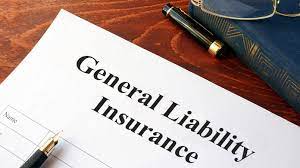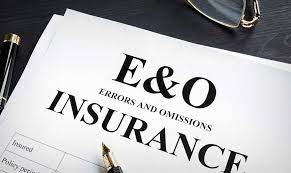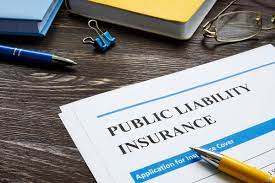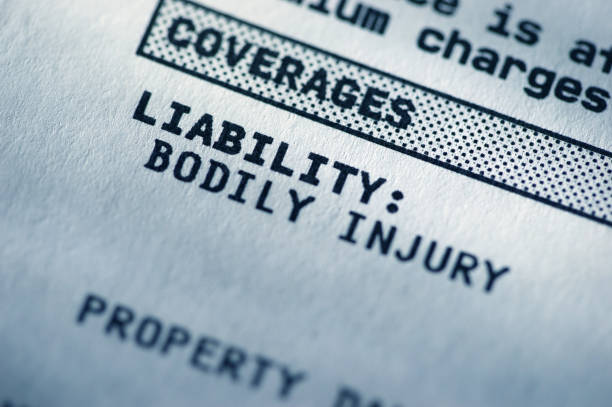Insurance against loss or harm claims for which a policyholder may be required to make restitution to a third party is known as liability insurance. The coverage provided by the insurance extends to losses brought on by legally recognized negligence, including actions or inactions that harm another person’s person, property, or legal interests.
Read on to learn more about liability insurance.
Check out Home Insurance Guide
What Is Liability Insurance?
Liability insurance is a type of insurance that offers defense against lawsuits brought by victims of injuries and property destruction to others. Any legal fees and payouts an insured party is accountable for if they are held legally liable are covered by liability insurance plans. However, liability insurance plans typically do not cover intentional harm or contractual obligations.
How Does Liability Insurance Work?
Liability insurance is essential when someone is responsible and at blame for another person’s injuries or when an insured party damages another person’s property. Liability insurance is, therefore, also known as third-party insurance. However, even if the insured party is held legally liable, liability insurance does not cover intentional or illegal actions.
Anyone who operates a company operates a vehicle, practices medicine, or practices law—in other words, anyone who could be held liable for losses and injuries—takes out insurance. Policies cover the insured and any third parties who may sustain injuries due to the policyholder’s negligent behavior.
For instance, most states mandate that car drivers carry liability insurance as part of their auto insurance contracts to cover damage to other people’s property and injury to others in the event of accidents. Likewise, to protect themselves if a defective product harms consumers or other third parties, a maker of goods may invest in product liability insurance.
Business proprietors can buy liability insurance if an employee is hurt while conducting business. Liability insurance plans are also necessary because of surgeons’ and doctors’ professional judgments.
You can check out
Benefits of Liability Insurance
- You might complete more significant contracts: Liability insurance coverage could aid you in winning more contracts if you frequently submit bids for significant contracts. This is because many businesses demand coverage before you can submit a proposal or complete a transaction. You have an advantage over the competition by already having your strategy.
- You may be protected from a data breach: Data protection is paramount. General liability insurance coverage is crucial if your business maintains customer records that include names, addresses, and social security numbers regularly. Electronic data liability is now a common clause in policies, and it could shield your business in the case of a hack. Remember that you may have options if your general liability policy does not cover these circumstances. Cyber liability coverage, different liability insurance, might be useful.
- Injury claims are nothing to fear: The likelihood of an injury claim rises if you frequently meet clients in person, either at your location or theirs. You can choose confidence over fear by understanding that your general liability insurance policy will secure you.
- Protection from staff or employee actions: An adage states it is difficult to obtain good help. Preventing employee or staff actions can be challenging, even though you attempt to retain the best staff possible. This includes minor offenses like slander and more severe ones like an accident involving injuries or property damage. In some circumstances, your general liability insurance contract may cover these third-party claims. However, there are times when you may need to include a unique clause or even a distinct policy known as personal liability coverage.
Types of Liability Insurance
1. General Liability Insurance

This kind of security is for more than just businesses. In truth, it’s a part of every home or auto insurance plan. This insurance shields you from financial losses due to third parties suffering bodily harm or property damage while on your land for business purposes or because of your goods or services.
For instance, your liability insurance would pay for the costs associated with the court proceedings (defense or investigation costs) if someone was injured on the property of your business and decided to sue you because it was claimed that your negligence caused the event.
2. Insurance for Professional Liability (Errors and Omissions)

Professional liability insurance, also known as errors and omissions insurance or malpractice insurance, is designed for businesses that provide professional services, including those provided by architects, engineers, healthcare providers, attorneys, and accountants. This insurance shields you from liability or carelessness that causes property damage or financial loss. It also covers costs incurred by the insured in the case of legal action, including attorney fees and compensation given to the complainant.
3. Directors and Officers Insurance

People in control of a company are subject to certain obligations, particularly when the company is being looked into for environmental violations, instances of corruption or unfair competition, or cases of tax evasion, bankruptcy, or legal trouble. Officers must act honestly, diligently, and in the best interests of their company. They are also accountable for their actions. Directors and Officers Liability Insurance protects policyholders from any monetary repercussions from their managerial actions.
4. Commercial Liability Insurance

Commercial general liability insurance, or comprehensive general liability insurance, is the industry standard. It offers insurance coverage for lawsuits resulting from injuries to employees and the general public, property damage caused by an employee, and injuries sustained due to employees’ negligence. Aside from intellectual property infringement, slander and libel, contractual liability, tenant liability, and employment practices liability, insurance may also cover these other things.
Any small or large company, partnership or joint venture, corporation or association, organization, or even recently acquired business can benefit from comprehensive general liability policies specifically designed for their needs. The following types of insurance are covered: liability for activities and premises; bodily injury; property loss; personal and advertising injury; medical payments. Insurance does not cover punitive damages for general and compensatory damages in cases.
5. Auto Liability Insurance

Another type of liability insurance is auto liability insurance, which pays for harm to other cars or property brought on by collisions involving your car. Damages to other vehicles, pedestrians, animals, and even buildings are all covered by your auto insurance coverage. In addition, your auto insurance policy includes coverage for damage to public roads and bridges, depending on where you reside.
6. Umbrella Insurance

A form of excess insurance known as umbrella insurance offers additional protection over and above what your main insurance policies provide. Businesses and professionals who need additional protection for valuable assets buy an umbrella policy. For instance, umbrella insurance would be regarded as liability insurance if it offered extra limits on your commercial liability insurance.
7. Public Liability Insurance

A person, a company, an event, a contractor, or even a community building may be covered by public liability insurance to protect them from the financial burden of legal fees should they be held accountable for someone else’s negligence-related death, or injury, property loss or damage, or economic loss.
If you run a business, you might be responsible for the harm done to someone else’s body or property. However, the likelihood of being sued for negligence is unpredictable and could result in significant financial loss for companies, even though liability insurance is typically optional.
Public liability insurance is optional, but in some circumstances, it may be required. Liability insurance, for instance, is required at some public gatherings and venues and is verified by the governing body.
8. Passenger Bodily Injury Liability Insurance

When an insured event specified in the insurance contract occurs, passenger bodily injury responsibility shields the insured from being held responsible for damages for physical harm, illness, mental anguish, or death sustained only by passengers. A passenger is anyone in, on, or boarding the aircraft to fly in it and anyone who alights (exits) the aircraft after a journey or attempted flight. Liability caps for each individual and each accident are stated.
9. Bodily Injury Excluding Passengers Insurance

When an insured event specified in the insurance contract occurs, bodily injury excluding passengers shields the insured from being held responsible for damages for bodily harm, disease, sickness, mental anguish, or death experienced by anyone other than passengers.
Also Read: Full Health Insurance Guide
How to Purchase Liability Insurance
In the United States, more than 2,700 businesses offer liability insurance, but 25 insurance companies account for more than half of the market. The largest names in insurance, such as Prudential, Allstate, State Farm, GEICO, Nationwide, Progressive, and Liberty Mutual, are well-known to most consumers.
The industry practice of independent insurance agents representing numerous insurance providers and the recent occurrence of online services that provide quick quotes help explain the high number of providers.
A consumer can obtain an estimate for any liability insurance—auto, homeowner, professional, and business—in just a few minutes or, with independent agents, in a day.
Is Liability Insurance Necessary?
With liability insurance, you and the injured party are financially guarded against unforeseen incidents that cause damage to a person, property, assets, reputation, or company. Liability insurance comes in various forms, including home, car, professional, and business insurance. The cost of liability insurance differs depending on the policy’s type, the level of protection you want, the number and size of claims you file while the policy is in effect, and market-rate factors. In most cases, incidents that happen and are recorded while your policy is in force are covered by your insurance. (However, exceptions to the report timing rules vary by policy and state rules.)
Conclusion
Liability insurance protects against lawsuits brought by accidents and property destruction victims.
Liability insurance pays for any court fees and judgments for which the covered party might be held accountable. Intentional harm, contractual liabilities, and criminal prosecution are examples of provisions that are not protected.
Automobile insurance plans, companies that make products, and people who work in the legal or medical professions frequently need liability insurance. Liability insurance includes coverage for business liability, workers’ compensation, and personal liability.
Frequently Asked Questions
What makes liability insurance necessary?
Your industrial setting’s liability insurance shields you from any financial responsibilities brought on by any incidents that take place there. This comprehensive liability insurance is a requirement for businesses to safeguard themselves against claims of property destruction or bodily harm resulting from their operations.
How does liability insurance risk work?
Being held accountable or responsible for a decision or inaction that results in a direct or indirect financial loss, whether or not at fault, is a form of operational risk known as a liability risk.
What is the ideal time to purchase expert liability insurance?
You can buy liability insurance as quickly as is practical. Professional liability insurance is a claims-made policy, so it only pays out if the event and lawsuit occur while the policy is in force. Since it may be years between an incident and the ensuing lawsuit, keeping continuous coverage in states with lenient statutes of limitations is crucial.
Most small business proprietors buy a professional liability insurance policy early and keep it for the duration of their company, ensuring no coverage gaps. However, bring it up with your insurance agent if you believe your company may be exposed or if you’ve let a previous policy expire. There may be methods to increase your level of security.
How do I file an insurance claim for general liability?
Call your insurance company to submit a general liability claim. In addition to basic details like your name, company name, and policy number, your agent will ask you to describe the incident. Your insurance representative will be able to walk you through the procedure and respond to any other inquiries you may have.
Do self-employed individuals require general liability insurance?
When a client or customer holds you accountable for an injury or piece of property harm, general liability insurance for contractors offers protection. Before signing a contract, your clients might demand that you acquire this coverage. Independent contractors are required to hold general liability insurance in some sectors, including the construction industry. An independent contractor may buy this insurance even if it’s not necessary to protect against.
References
